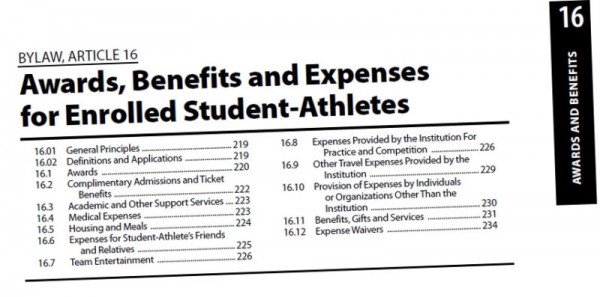Enough Confusion, NCAA Looks to Trim Down Rulebook
Posted by EJacoby on February 17th, 2012Evan Jacoby is a regular contributor for RTC. You can find him @evanjacoby on Twitter.
What is and what isn’t against the NCAA law these days? The line between a ‘good deed’ and a ‘violation’ has become so thin that not even the original lawmakers are able to easily distinguish the difference. And coaches in fierce competition for recruits? Forget about it. There are so many minor rules about extensive contact that it is impossible to police every one of them. That’s why the NCAA is finally working to create a slimmer and more efficient rulebook to make it easier for all parties to follow the rules. We certainly love the thought of trimming down the book, but it will not be an easy task.
“It’s very complicated to take a 400-plus-page rule book and shrink it down to something sensible, but we’re going to do it,” said NCAA President Mark Emmert last month. The most meaningful idea changes being discussed include making all transfers eligible to play immediately during the next semester rather than having to sit out a full year at their new school. The transfer rule has been noted as unfair for players, considering that coaches are allowed to bolt from school to school whenever they see more money or a better opportunity, but student-athletes need a waiver signed by the school and are required to sit out a full year before they can even join a new team. Another idea being discussed is to allow coaches to talk publicly about unsigned recruits since Twitter and other social media have made it so difficult to track everything being mentioned publicly. It’s unclear if public discussion would even have an influence on recruits’ decisions.
Many other restrictions would also be eliminated regarding what recruits can be provided. These rules are unclear as currently constructed and have led to major suspensions for players that may not have even known that they did anything wrong. Connecticut freshman Ryan Boatright was suspended twice this season for an infraction involving accepting a plane ticket in an issue that still remains unresolved. Vanderbilt center Festus Ezeli was suspended for the first six games of this season for accepting a meal and a hotel room, and that violation was even self-reported. Baylor forward Perry Jones missed the first five games of this season due to small loans that his mother received. All three of these suspended players are top contributors for their respective teams and may have only been suspended because their lives are much more publicized than lesser players. It’s obvious that accepting a meal or a plane ticket is far from the worst thing that a recruit has done in the past year.
As currently constructed, it’s a violation for schools to provide more cream cheese spread for a player’s bagel than what is legally allowed. This might be the single most absurd rule in the book, but there are plenty of crazy and unenforceable rules in existence. It might take a long time and a lot of work to make it happen, but it’s necessary to create a much more efficient rulebook. At least the NCAA has recognized the problems and is working to fix them.











































